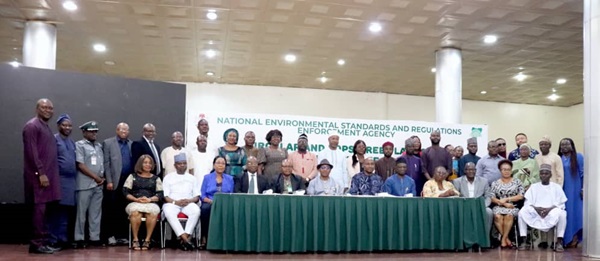
Nigeria’s Minister of Environment, Mallam Balarabe Lawal has issued a bold call for African nations to unite in phasing out toxic plastics and persistent organic pollutants (POPs), warning that continued exposure is not only damaging ecosystems and public health but perpetuating systemic inequality.
He made this call, in Abuja, during the inception workshop of the “Circular and POPs-Free Plastics in Africa” project organised by the National Environmental Standards and Regulations Enforcement Agency (NESREA) with support from the United Nations Environment Programme (UNEP) and the Global Environment Facility (GEF).
Lawal emphasised the urgent need to stem the tide of hazardous chemical-laden plastics, especially in the automobile, construction and electronics sectors. He framed the issue; not just as an environmental crisis but as an obstacle to sustainable development and justice.
“To break free from environmental oppression and build an Africa where people and nature can thrive, we must drastically reduce the import, production and use of persistent organic pollutants,” Lawal declared.
The Circular and POPs-Free Plastics project, he explained, is designed to curb both the spread of plastics embedded with POPs and the generation of unintentionally-produced POPs (uPOPs) – dangerous byproducts of poor waste management practices such as open burning.
“These chemicals persist in our environment for decades, contaminate our food chains, and increase disease burdens. The evidence is clear—they must be eliminated from our economies,” Lawal said.
Plastics, while offering numerous benefits, also come with significant downsides. Lawal highlighted that more than three-quarters of Nigeria’s plastic waste ends up in open dumps, waterways, or is burned in open air – practices that not only release uPOPs but also clog drainage systems and contribute to flooding.
Compounding the issue is the widespread use of hazardous additives, such as brominated flame retardants, in consumer products. These additives, classified under POPs, enhance product properties like fire resistance but have been linked to cancer, reproductive disorders and neurotoxicity.
“Scientific evidence shows that POPs accumulate in the environment and in human tissues. They are released throughout the lifecycle of plastics, from production to disposal, contaminating our air, water and soil,” he added.
Represented by Yunuss Abdul-Ganiyu, a director in the ministry, Lawal called for the identification and adoption of safer, eco-friendly alternatives to POPs-containing plastics and for the development of suitable technologies to manage contaminated waste.
Beyond health and environmental concerns, Lawal underscored the economic implications of continuing on the current path. “Contaminated materials cannot be safely reused, recycled, or reintroduced into the value chain,” he warned, referencing UN Environment data that show how POPs undermine the viability of a circular economy.
However, he stressed that this challenge also presents an opportunity. “Actions taken on this project will not only protect our environment—they will create jobs and investment opportunities in green industries and sustainable waste management,” he said.
To that end, the Ministry of Environment has already developed a National Policy on Plastic Waste Management and Nigeria’s Nationally Determined Contributions (NDCs) under the Paris Agreement emphasise the importance of sustainable waste practices.
Nigeria, as a key hub for electronic goods in West Africa, has a particular responsibility to lead in this area, Lawal stated, noting the electronics sector’s prominence in generating POP-laced waste.
The minister called for a whole-of-society approach involving government, academia, private sector, civil society and international development partners. “This project will only succeed if we work together to align regulation, innovation and community action,” he said.
Backing this stance, the director-general, NESREA, Prof. Innocent Barikor highlighted the profound health and ecological risks posed by POPs, calling them a “silent crisis.”
“POPs are carcinogenic and mutagenic. They cause cancer, genetic mutations, reproductive problems and disrupt immune systems. And they don’t go away,” Barikor explained.
He pointed to chemicals like polybrominated diphenyl ethers (PBDEs)—used in plastic casings of electronics—as prime culprits. These compounds are toxic, chemically stable and bio-accumulative, spreading through food chains and affecting biodiversity.
According to Barikor, the lifecycle of electronic products, from production to end-of-life, contains multiple points where POPs can leach into the environment. Poorly managed electronic waste, a growing concern across Nigeria, is now a primary pathway for POP exposure.
Barikor said the new project offers an unprecedented chance to strengthen Nigeria’s regulatory frameworks. It builds upon existing instruments such as the National Environmental (Electrical/Electronics Sector) Regulations, 2021 and complements the National Policy on Plastic Waste Management.
“We now have the tools and partnerships to transform this sector into a model of environmental responsibility, grounded in circular economy principles,” he said.
He urged stakeholders to seize the moment: “This isn’t just about compliance. It’s about safeguarding lives, protecting our ecosystems, and making choices today that will define the future of our country.”
Both Lawal and Barikor closed their remarks by emphasising the broader stakes. POPs-free plastics are not just an environmental or technical issue—they represent a litmus test of Nigeria’s commitment to equity, sustainability and intergenerational justice.
“We must act with urgency and unity,” Lawal concluded. “The choices we make now, whether to persist in harmful practices or pivot to sustainability, will shape the kind of Africa we leave behind. Let us choose wisely.”

